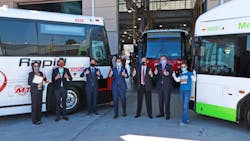San Diego MTS continues building clean air fleet with retirement of last diesel buses, adds more electric buses
The last diesel buses have officially been retired from the San Diego Metropolitan Transit System (MTS) fleet; the agency also added two more electric buses to its fleet.
“MTS retiring the last of its diesel buses from its fixed-route fleet is a monumental leap forward in air quality,” said Nathan Fletcher, MTS Board chair and chair, San Diego County Board of Supervisors. “It represents our commitment to environmental justice, sustainability, air quality and to being one of the leaders nationally in achieving these ambitious environmental standards.”
Replacing the last diesel buses will be 24 Compressed Natural Gas (CNG) express commuter buses built by Motor Coach Industries (MCI).
“Not only do the new MCI CNG buses offer an improved riding experience for our customers, but we also get substantially better air quality results from them as well,” said Sharon Cooney, MTS CEO. “There will be a 100-percent reduction in particulate matter and a 98-percent reduction in NOx emissions over the diesel counterparts.”
The new express commuter buses will offer 57 comfortable forward-facing seats, are designed for highway speeds and offer touring class comfort and safety. The vehicles will operate out of MTS’ East County Division in El Cajon, serving passengers on the Rapid Express 280 (Escondido-Downtown San Diego) and Rapid Express 290 (Rancho Bernardo-Downtown San Diego).
“For nearly three decades we’ve led the transition to CNG propulsion, having delivered nearly 14,000 CNG buses and coaches across North America. Today, we’re proud to support the San Diego MTS in achieving this low-emission milestone. With clean, safe and readily scalable technology, CNG emits significantly less nitrogen oxide than diesel engines – lending immediate impact on improving air quality,” said Chris Stoddart, president, New Flyer and MCI. “MTS has long pioneered sustainable mobility, having been the first agency in America to adopt CNG into its fleet nearly 20 years ago. Congratulations on yet another leap forward to cleaner air, sustainable transit, and more livable communities.”
At the same time as retiring the diesel fleet, MTS also added two GILLIG zero-emission battery electric buses, upping the agency’s total to eight. MTS began its zero-emission bus pilot program in 2017 and intends to complete a full transition to 100 percent zero emissions fixed-route vehicles by 2040. The two California-made GILLIG buses are the first of seven to be delivered to MTS. GILLIG’s zero-emission battery electric buses are equipped with the Cummins electrified powertrain and are supported by a nationwide service network. Built on GILLIG’s low floor platform, the buses ensure parts and training commonality with MTS’s existing GILLIG fleet. Equipped with six onboard batteries, each bus has a battery capacity of 444 kWh, providing an estimated range of 140 miles. The buses utilize energy recovered from a regenerative braking system and feature a direct-drive traction motor with peak torque of 3500 Nm (2,582 lbs.-ft.).
“We are excited to partner with the San Diego Metropolitan Transit System as they work towards their Innovative Clean Transit goal of a 100 percent zero-emission fleet by 2040,” said Bill Fay, GILLIG vice president of sales. “The new battery-electric buses support MTS’s commitment to excellent service and cleaner air for the communities they serve, and GILLIG is proud to be a part of this step forward.”
Other milestones in MTS’ efforts to improve air quality through its fleet:
- Embarking on a path towards full zero-emissions by the year 2040 or sooner.
- Becoming one of the first transit agencies in the U.S. to move to a CNG bus fleet in the early 2000s.
- Using a renewable form of natural gas sourced from waste to fuel its entire fleet of 40-, 45- and 60-foot fixed-route buses.
- Operating a Trolley fleet running on 100 percent electricity derived from sustainable sources in FY 2020.
- Transitioned to eco-friendly propane gas for its minibus and paratransit fleet, reducing emissions by nearly three million pounds per year.
- Installed 500 solar-power bus shelters.
- Built two new LEED-certified bus operations and maintenance facilities in El Cajon and Chula Vista.



